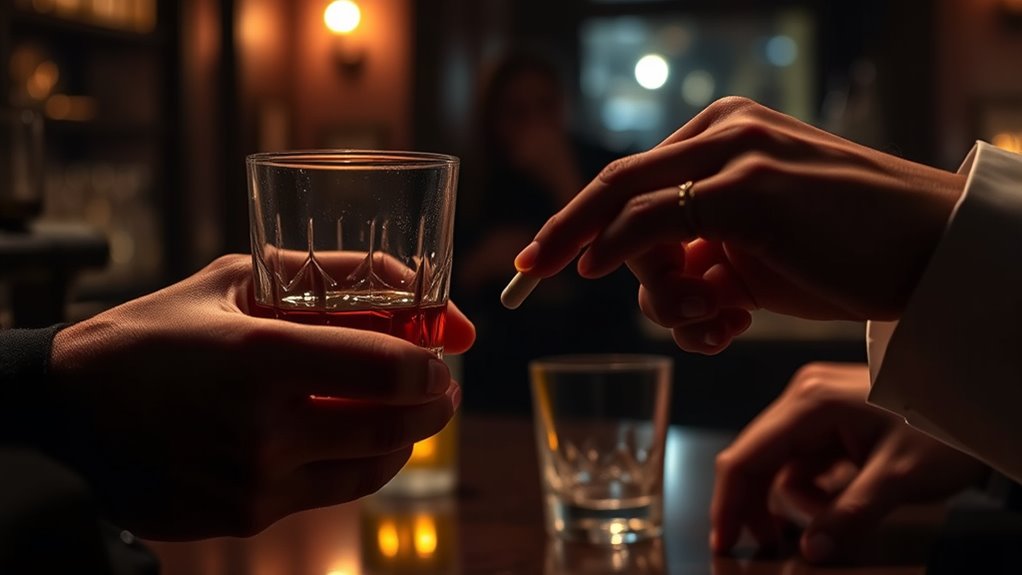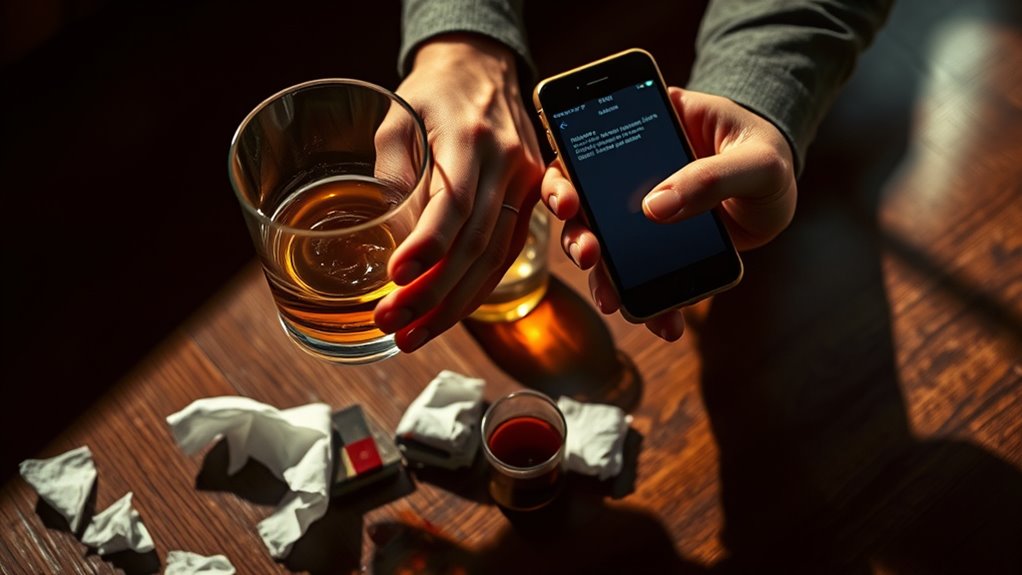Drinking alcohol doesn’t directly cause infidelity, but it definitely lowers your inhibitions and makes it easier to act on impulses or external pressures. When you drink, your emotional vulnerabilities like stress or insecurity get amplified, making it harder to resist temptation. Social environments and peer influences also play a role in encouraging risky behavior. If you want to understand how alcohol’s effects can increase the risk of cheating, there’s more to contemplate below.
Key Takeaways
- Alcohol lowers inhibitions and impairs judgment, increasing the likelihood of engaging in infidelity.
- Emotional triggers like loneliness or insecurity are amplified by alcohol, making cheating more tempting.
- Social environments that normalize heavy drinking can subtly endorse risky behaviors, including cheating.
- Alcohol acts as a disinhibitor, intensifying vulnerabilities that may lead to impulsive infidelity.
- Being mindful of alcohol’s effects and emotional triggers can help prevent risky behaviors like cheating.

Cheating and substance abuse are serious issues that undermine integrity and harm individuals’ health and reputation. When it comes to understanding whether drinking can lead to infidelity, it’s important to recognize how emotional triggers and peer influence play significant roles. Alcohol often lowers your inhibitions, making you more vulnerable to acting on impulses you might normally suppress. If you’re feeling stressed, lonely, or insecure, alcohol can intensify those feelings, leading you to seek comfort or validation elsewhere. These emotional triggers, when combined with alcohol, can cloud your judgment and make infidelity seem more tempting or acceptable in the moment.
Alcohol lowers inhibitions, intensifies emotional triggers, and clouds judgment, increasing temptation for infidelity.
Additionally, the social environment and peer influences can significantly impact decision-making, especially when alcohol is involved. Peer influence is another powerful factor that can push you toward risky behaviors, including cheating. If your friends or social circle normalize heavy drinking or casual attitudes toward fidelity, you may find yourself more inclined to follow suit. When alcohol is involved, it’s easier to dismiss concerns about consequences or morality because your decision-making is impaired. You might think, “Everyone’s doing it,” or convince yourself that a one-time mistake won’t matter, especially when under the influence. Peer influence doesn’t just encourage drinking; it can subtly reinforce beliefs that cheating is acceptable or less serious than it really is, making it more likely that alcohol becomes a catalyst for infidelity.
It’s essential to understand that alcohol doesn’t directly cause cheating or infidelity. Instead, it acts as a disinhibitor, lowering your defenses and amplifying emotional triggers that might otherwise be manageable. If you’re already feeling vulnerable or emotionally unsettled, drinking can make it harder to resist temptation or make rational decisions. In environments where peer influence is strong, you might find yourself participating in behaviors you wouldn’t normally consider, simply because alcohol makes you more receptive to external pressures and less aware of the potential fallout. Furthermore, advancements in AI technology are transforming social interactions and decision-making processes, which can influence behavior in subtle ways.
Being mindful of these dynamics helps you recognize situations where alcohol could impair your judgment. If you’re aware of your emotional triggers—like feeling lonely, angry, or insecure—and the influence of your social circle, you can take steps to protect yourself. Setting boundaries, avoiding risky situations, and cultivating healthy coping strategies are indispensable. Remember, alcohol can be a trigger not just for poor decisions related to cheating but also for emotional distress, which in turn can lead to further complications. Staying aware of these factors empowers you to make choices aligned with your values, rather than reacting impulsively when under the influence.
Frequently Asked Questions
Can Moderate Drinking Still Impact Fidelity?
Yes, even moderate drinking can impact fidelity. Social norms often shape how much you drink, and peer influence might encourage you to loosen your boundaries. When you consume alcohol, you may feel less inhibited and more susceptible to risky situations or temptations. This lowered restraint can increase the likelihood of infidelity, especially in environments where drinking is linked to social bonding or peer pressure.
Are Certain Substances More Linked to Infidelity?
Some substances are definitely more linked to infidelity, especially those causing intense substance dependency, like opioids or stimulants. You might not realize how peer influence pushes people toward risky behavior, including cheating, when under the influence. These powerful substances can distort judgment and amplify impulses, making infidelity seem like an acceptable choice. So yes, certain drugs have a much stronger connection to betrayal, especially when dependency and peer pressure are involved.
How Does Alcohol Affect Decision-Making in Relationships?
When you drink, alcohol affects your emotional regulation and impulse control, making it harder to think clearly. You might feel more impulsive, less able to resist temptation, and less aware of your actions’ consequences. This impairs your decision-making, increasing the likelihood of risky behaviors like infidelity. So, if you want to protect your relationship, it’s best to be mindful of how alcohol influences your emotions and impulses.
Is There a Difference Between Casual Drinking and Addiction?
Casual drinking differs from addiction mainly in frequency and control. Social influence and cultural norms often shape your drinking habits, making casual drinking seem normal. However, addiction takes over, leading you to crave alcohol constantly, despite negative consequences. While social settings may encourage casual drinking, addiction requires professional help and a conscious effort to regain control. Recognizing the difference is vital for your health and relationships.
What Are Long-Term Effects of Substance Abuse on Relationships?
Long-term substance abuse can chip away at your relationship like a relentless tide. It fosters emotional dependency, making you rely more on substances than your partner, and erodes trust over time. This damage can lead to emotional disconnection and broken bonds, leaving both of you feeling isolated. If unchecked, these effects can transform a once-solid partnership into a fragile shell, struggling to withstand the weight of ongoing addiction.
Conclusion
So, next time you reach for a drink, remember it might cloud your judgment and lead to risky choices, like infidelity. For example, imagine a friend who, after a few drinks, confesses an affair she wouldn’t have considered sober. While alcohol doesn’t directly cause cheating, it can lower inhibitions and impair decision-making. Stay mindful of how substance use influences your actions—protect your relationships by making conscious choices, sober or not.









